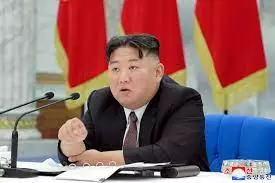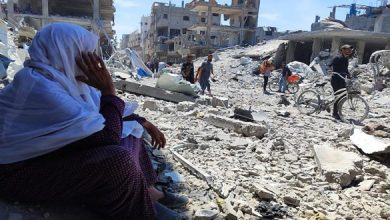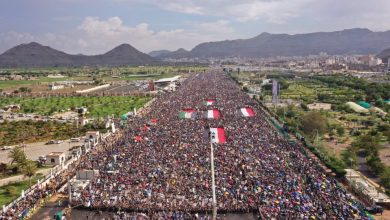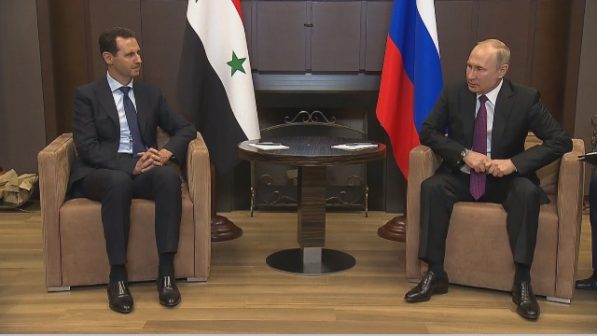North Korean Leader Orders More Drones, Nuclear Weapons

North Korean Leader Kim Jong-un has ordered an expansion of the country’s nuclear arsenal and underscored the importance of drones as he addressed a meeting of the Workers’ Party of Korea, the Korean Central News Agency reported.
According to the report, Kim stated the country in 2024 will lay a foundation for producing nuclear weapons in an increasingly large quantity in the future.
He added contemporary warfighting also requires production of all kinds of drones and electronic warfare systems.
The North Korean leader called for a “second revolution in shipbuilding” and building a bigger fleet of submarines and surface warships.
Kim has also ruled out any possibility of reunification and reconciliation with South Korea, warning that Pyongyang will not hesitate to take “serious action” in case of a “military confrontation” by Washington and Seoul.
He said the inter-Korean ties had become “a relationship between two hostile countries and two belligerents at war”, as South Korea is seeking a “regime collapse” in the North.
“It’s time for us to acknowledge the reality and clarify our relationship with the South,” Kim continued, adding that if Washington and Seoul were to attempt a military confrontation with Pyongyang, its “nuclear war deterrent will not hesitate to take serious action.”
“I believe that it is a mistake that we must no longer make to deal with the people who declare us as ‘the main enemy’ and seek only opportunities for ‘[our] regime collapse’ and ‘unification by absorption’ by collaborating for reconciliation and unification,” the North Korean leader stressed.
Since 1953, when the Korean War ended with an armistice, North and South Korea have been cut off from each other. Both governments have been seeking the goal of reunifying one day.
On Thursday, the KCNA reported that Kim has called for the acceleration of war preparations in response to what he described as “unprecedented” confrontation moves from the United States.
Speaking at an ongoing meeting of the country’s ruling Workers’ Party, Kim “set forth the militant tasks for the People’s Army and the munitions industry, nuclear weapons and civil defense sectors to further accelerate war preparations”.
Kim also stressed that the “military situation” on the Korean peninsula had become “extreme” due to “unprecedented” anti-North confrontations with the US, KCNA said.
The state news agency did not go into detail on the preparations.
South Korea, Japan and the US have deepened political and defense cooperation this year in the face of a record-breaking series of weapons tests by Pyongyang and recently activated a system to share real-time data on North Korean missile launches.
Earlier this month, a US nuclear-powered submarine arrived in the South Korean port city of Busan, and Washington has deployed its long-range bombers in drills with Seoul and Tokyo.
Pyongyang, meanwhile, successfully launched its first military spy satellite on the third attempt, tested the solid-fuelled Hwasong-18, its most advanced intercontinental ballistic missile (ICBM), and enshrined nuclear power status in the country’s constitution.
Kim earlier this week defined 2023 as a “year of great turn and great change” in which Pyongyang saw “eye-opening victories”.
Last week, the United Nations atomic agency announced a second reactor at North Korea’s Yongbyon nuclear facility appeared to be operational, calling it “deeply regrettable”.
Kim’s comments suggest North Korea is unlikely to slow the pace of its weapons tests or military modernization, although some analysts believe he aims to build leverage towards diplomacy with Washington, possibly after the US presidential election in November next year.
Nuclear talks collapsed in 2019 after the failure of a series of high-stakes summits with then-President Donald Trump over sanctions relief in return for a partial surrender of Pyongyang’s nuclear program. The country has been under UN Security Council sanctions since it first conducted a nuclear test in 2006.
North Korea has been deepening ties with Moscow, and Kim told party delegates Pyongyang would further expand strategic cooperation with “anti-imperialist independent” countries.
Kim made a rare trip outside his country in September when he met Russian President Vladimir Putin in the Russian Far East touring the Vostochny Cosmodrome and later visiting military bases and weapons factories. The meeting took place amid concerns Pyongyang was supplying military equipment to Moscow for use in its war with Ukraine in exchange for Russian technological know-how.
Kim also laid out economic goals for 2024, calling it a “decisive year” to accomplish the country’s five-year development plan and stressing the importance of agriculture, the report added.




